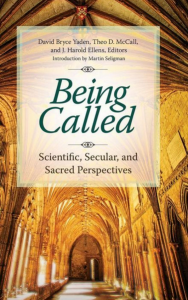Book Review: Being Called: Scientific, Secular, and Sacred Perspectives

Being Called is an academic collection of essays that attempts to define and explain the experience of a “calling” from scientific, secular, and sacred perspectives in order to bridge the so-called big questions found in religions and other spiritual traditions with the “scientific inquiry into the nature of consciousness, our place in the universe, and the future of the species.” It makes sense, after all, given that scientific, or naturalistic, inquiry derived largely from the church, that is until its findings became threatening to the validity of sacred truths held dear to the foundations of the faith.
In a way, Being Called is the start of a much-needed conversation about purpose and the derivation of purpose specifically through the lens of a specific experience of purpose—a calling. The idea of a calling, which has historically carried tremendous religious significance, typically describes a specific, concrete incident in one’s life where a life purpose is elucidated through what is usually interpreted as a direct message from God or a divine messenger. In modern times, it has been used more broadly to describe any “mystical” (possibly hallucinogenic) event or moment when one reaches an epiphany about “intrinsically motivated, meaningful, and prosocially oriented work” (a definition derived from Chapter 3, “Road to Damascus Moments: Calling Experiences as Prospective Epiphanies” by David Bryce Yaden and Andrew B. Newberg). In fact, according to a Gallup poll cited in the book, 41 percent of Americans feel strongly that they have had “a profound religions experience or awakening that changed the direction of [their] life.”
Yet even those definitions are insufficient in expressing the breadth of conceptualizations of what a “calling” consists of and where that sense of purpose or conviction comes from. This work fearlessly introduces the many possible understandings using the language of psychology, theology, and business; research grounded in methodological definitions of a calling within different faith traditions, cultures, and contexts; and personal experiences of callings described more lyrically to try and convey the “transcendental” nature of some callings. Martin Seligman, a pioneer of positive psychology, aptly introduces the book by inviting readers to “suspend belief,” and to also “suspend disbelief”—I say aptly because one cannot read this work expecting to conclude with one single truth about purpose.
No matter their personal faith or identity, readers should expect to feel challenged by the main paradigms. Part one consists of secular and scientific perspectives, mostly consisting of empirical and social-scientist modelling of what a calling is, while the latter half of sacred perspectives speaks primarily through the language of transcendence, mysticism, and spiritualism. (I would suggest the reader become acquainted with sociologist Émile Durkheim’s conceptions of the sacred and the profane as a primer.)
For example, Chapter 6, “Folk Theories of Calling Chinese Cultural Contexts” by Kaiping Peng and Yukun Zhao, explores the Chinese contextualization of a calling by asking 188 Chinese psychology students about their sense of calling using the two most approximate words in Chinese, zhaohuan, “summoning,” and shiminggan, “mission.”
Chapter 8, “On Call: Physician Perspectives on Callings in Medicine and Medical Education” by Mary “Bit” Smith and Susan Rosenthal, compares the calling to be a doctor with a religious one: “The call of the physician, while not necessarily of divine origin, nevertheless requires a kind of faith…the physician responds, not wholly unlike the priest or prophet, to a calling that pulls her toward greater meaning, service, and connection with the other.”
Personally, I found it difficult to suspend my disbelief for why the derivation of religious purpose must be weaved into the fabric of fiction (seems like an attempt to doublethink certainty into uncertainty) when it is just as nonreligious an experience as the secular experience of a calling—but perhaps that is due to my own limitations. In Chapter 5, “Call to Nonduality,” which introduces an Eastern derivation of purpose from the idea of nondualism, a universal nonsubject/non-object consciousness, Zoran Jospovic and Judith Blackstone acknowledge such a limitation: “Admittedly, it is difficult for a western scientific mind raised on postmodernist constructivism to conceive of the possibility this background awareness, let along that the positive qualities we are so accustomed to thinking of as requiring effort and cultivation could somehow be spontaneously present within us.” (I do not doubt this has the possibility of being true, especially with the lack of knowledge we have at the quantum material level, but it is not, to me, worth speculating about at great length.)
I would have liked to see additional input from neuroscientists exploring epiphanies, “transcendental” experiences, and hallucinogenic drug-induced visions, but my guess is that directly studying callings in the lab would be a Catch-22: to study it empirically, one would have to be able to reproduce it, but one must understand it to be able to reproduce it.
And Being Called does critique the inadequacies of both perspectives, the scientific and the sacred, in fully explaining the human experience. It’s a challenge psychologists are keenly aware of given the mind versus brain dilemma (aka what is consciousness or “I think, therefore I am”) and Gestaltism, the idea that an experience is irreducibly more than the sum of its parts, both of which are foundational to many branches of psychological study.
After reading this book, I remain unconvinced that it’s necessary to explore what a “calling” is in order to find meaning in life or discover one’s purpose (often catalyzed by empathy and the sharing of a common humanity). I do, however, recommend this work to anyone seeking a sounding board and starting point for a holistic internal dialogue about what it means to be destined, preordained, or meant to do something.
[Full disclosure: David Bryce Yaden, first-credited editor of this work, will be a panelist at Common Ground 2015, a free conference co-sponsored by the American Humanist Association, Xaverian Missionaries, and Rutgers University on October 8, 2015. He will elucidate some of his own ideas on finding meaning in life during session one.]
